大学英语语法和写作College English Grammar and Writing 15 Sentences23页PPT
大学英语语法3——形容词资料讲解
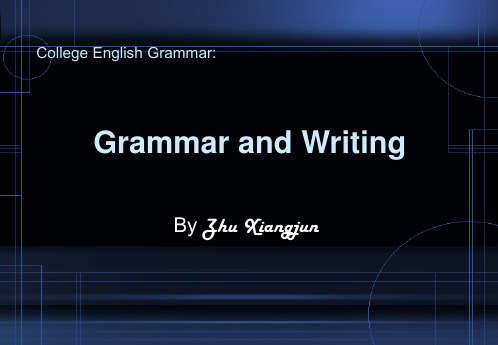
a popular singer → The singer is popular.
Some words can only be used as predictive adjectives. They have no degree of comparison and cannot be modified by degree adverbs such as too, very, much, almost, nearly, enough, hardly and so on.
• Generally, adjectives may be classified into two: one is attributive adjectives which are placed before nouns and the other is predictive adjectives which are placed after link verbs.
Most adjectives with initial letter a- are predictive
adjectives, such as afraid,alike,alive,alone, asleep,awake, ahead, ashamed etc.
And some others are ill, well, faint, glad, pleased, sorry, sure, certain, unable, ready, fond and so on.
Modifiers
A modifier is any word that acts to describe or qualify another word in such a way that it enriches the other words meaning. It usually may be an adjective, an adverb or a prepositional phrase. Adding modifiers can make sentences more explicit, more interesting and more powerful. Let’s look at an example.
大学英语作文关于英语语法令我头疼

大学英语作文关于英语语法令我头疼全文共3篇示例,供读者参考篇1College English Composition: English Grammar Makes My HeadacheLearning English grammar has always been a challenging part for many college students, including myself. It's not only because English grammar rules are intricate and complex, but also because there are so many exceptions that make it difficult to remember. This is why I often find myself scratching my head in frustration whenever I come across a grammar question in my assignments or exams.One of the biggest headaches for me is the proper use of tenses. English has twelve tenses, and each tense has its own rules and usage. Sometimes it's hard to determine which tense to use in a particular situation, especially when the context is not clear. This often leads to confusion and errors in my writing.Another grammar issue that I struggle with is the use of articles. In English, there are two types of articles: indefinite (a, an) and definite (the). Knowing when to use each type of article canbe a challenge, especially when dealing with countable and uncountable nouns. I often find myself unsure whether to use "a" or "an" before a word, which can affect the overall clarity of my writing.Subject-verb agreement is another aspect of English grammar that gives me headaches. It's essential to ensure that the subject and verb in a sentence agree in number and person. However, sometimes I find it hard to determine whether to use a singular or plural verb, especially when dealing with compound subjects or tricky sentence structures.Punctuation is another aspect of English grammar that often confuses me. Knowing when to use commas, semicolons, colons, and dashes can be challenging, and improper punctuation can change the meaning of a sentence entirely. This is why I always have to double-check my punctuation while writing to ensure clarity and correctness.Despite these challenges, I understand the importance of mastering English grammar. Good grammar skills not only help improve communication but also enhance writing fluency and coherence. Therefore, I try to overcome my grammar struggles by seeking help from my instructors, using grammar resources, and practicing regularly. I believe that with time and effort, I willbe able to conquer my difficulties with English grammar and become a better writer and communicator.篇2College English Essay: English Grammar Gives Me a HeadacheEnglish grammar is a fundamental aspect of the English language, and as a college student studying English, I have come to learn that mastering grammar is crucial for effective communication and writing. However, I must admit that English grammar often gives me a headache. The rules, exceptions, and nuances of English grammar can be overwhelming and confusing at times. In this essay, I will discuss some of the challenges I face with English grammar and share strategies that have helped me overcome them.One of the main challenges I encounter with English grammar is the sheer number of rules and exceptions to those rules. For example, the rules regarding subject-verb agreement, verb tenses, and pronoun usage can be difficult to remember and apply correctly. Additionally, English has many irregular verbs, plurals, and pronouns that do not follow standard patterns, making it even more confusing for non-native speakers like me.Another aspect of English grammar that I find challenging is understanding the nuances of the language. English has many subtle rules and conventions that native speakers intuitively understand but are not always explicitly taught in grammar books. For example, knowing when to use articles (a/an/the) or prepositions (in/on/at) can be tricky for non-native speakers, as the usage often depends on context and idiomatic expressions.Moreover, the syntax and sentence structure of English can be complex and varied, requiring a deep understanding of grammar rules to construct coherent and grammatically correct sentences. For example, the use of passive voice, relative clauses, and conditional sentences can be confusing for non-native speakers, as they involve specific word order and verb forms that must be used correctly.Despite the challenges I face with English grammar, I have found several strategies that have helped me improve my grammar skills. Firstly, I make a conscious effort to practice grammar regularly by reading books, articles, and essays written in English. This exposure to written English helps me internalize grammar rules and patterns, making them easier to remember and apply in my own writing.Secondly, I rely on grammar resources such as textbooks, online grammar guides, and grammar-checking tools to clarify any doubts or questions I have about specific grammar rules. These resources provide clear explanations, examples, and exercises that help me reinforce my understanding of English grammar.Additionally, I actively seek feedback from my professors, tutors, and peers on my writing, as they can point out any grammar errors or mistakes that I may have overlooked. By receiving constructive criticism and guidance, I can learn from my mistakes and improve my grammar skills over time.In conclusion, English grammar can be a challenging aspect of language learning, but with dedication, practice, and the right resources, it is possible to overcome these challenges and become proficient in English grammar. As a college student studying English, I continue to work on improving my grammar skills and expanding my knowledge of the language. While English grammar may give me a headache at times, I am determined to master it and become a confident and competent English speaker and writer.篇3College English Essay: English Grammar Gives Me a HeadacheEnglish grammar is one of the most challenging aspects of learning the language for many students, myself included. The rules and exceptions can be confusing and overwhelming, making it difficult to express oneself accurately and proficiently. In this essay, I will delve into the reasons why English grammar gives me a headache and the strategies I use to overcome these obstacles.To begin with, English grammar is notorious for its complex rules and exceptions. There are countless rules for verb tenses, sentence structure, punctuation, and more, all of which must be followed precisely to communicate effectively. Additionally, English is a language with many irregular verbs, pronouns, and spelling patterns, adding to the confusion and difficulty of mastering its grammar.Another reason why English grammar is so challenging is the lack of consistency in the language. Unlike some languages with straightforward rules and patterns, English grammar often defies logic and can be unpredictable. For example, irregular plurals, verb conjugations, and sentence constructions can vary wildly and make it challenging to memorize and apply consistently.Furthermore, English grammar can be intimidating due to the pressure of communicating accurately and effectively. As a student, I often feel self-conscious about making mistakes in my writing and speaking, knowing that grammar errors can detract from my message and credibility. This fear of judgment and criticism can create a mental block that impedes my ability to communicate confidently and fluently in English.Despite these challenges, I have found several strategies to help me navigate the complexities of English grammar more effectively. Firstly, I actively engage in grammar practice and exercises to reinforce my understanding of key concepts and rules. By practicing regularly, I can internalize the rules and patterns of English grammar, making it easier to apply them in my writing and speaking.Secondly, I seek feedback from professors, tutors, and peers to identify areas of improvement in my grammar skills. Constructive criticism and guidance from others allow me to pinpoint my weaknesses and address them proactively, leading to gradual improvement and development in my grammar proficiency.Lastly, I strive to approach English grammar with a positive and curious mindset, embracing mistakes as opportunities forgrowth and learning. By viewing grammar challenges as stepping stones rather than stumbling blocks, I can cultivate resilience and perseverance in my language learning journey.In conclusion, English grammar can be a formidable adversary for many students, presenting a myriad of rules, exceptions, and inconsistencies that can be overwhelming. However, with dedication, practice, and a positive attitude, it is possible to overcome these challenges and enhance one's proficiency in English grammar. By adopting effective strategies and seeking support from others, I have learned to navigate the intricacies of English grammar and improve my communication skills gradually. Ultimately, mastering English grammar is a rewarding and empowering achievement that opens doors to greater opportunities and success in both academic and professional settings.。
关于英语语法令我头疼的大学英语作文

关于英语语法令我头疼的大学英语作文English: One aspect of college English compositions that often causes me headaches is English grammar. The intricate rules and nuances of English grammar can make it challenging to accurately convey my ideas and thoughts in writing. From understanding the difference between various verb tenses to correctly using punctuation marks, there are numerous grammar rules that I need to navigate while composing a piece of writing. Additionally, maintaining proper subject-verb agreement and word order can often be confusing, leading to errors in my writing that can impact the clarity and coherence of my work. Despite studying grammar rules and practicing writing exercises, I still find it difficult to master all the intricacies of English grammar.中文翻译: 大学英语作文中让我头疼的一个方面是英语语法。
英语语法的复杂规则和微妙差别使得在写作中准确表达我的思想和想法变得具有挑战性。
大学英语语法7——介词短语
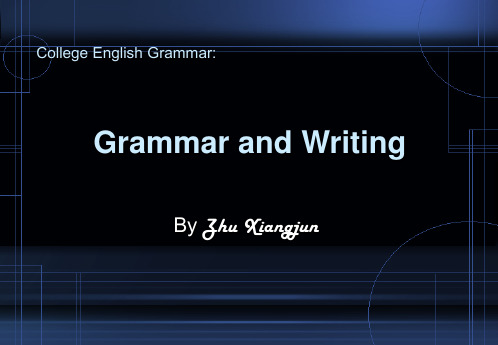
• “Coming!" Away she skimmed over the lawn, up the path, up the steps, across the veranda, and into the porch.
1. Form A prepositional phrase=a preposition+(adjectives)+a noun/pronoun
• I often consulted the adviser. • During my study period, I often consulted the adviser about
my selective courses.
2. Functions Prepositional phrases have three formal functions in sentences. They can act as an adjective modifying a noun, as an adverb modifying a verb, or as a nominal when used in conjunction with the verb form to be.
大学英语语法1——主语谓语(1)教学文案
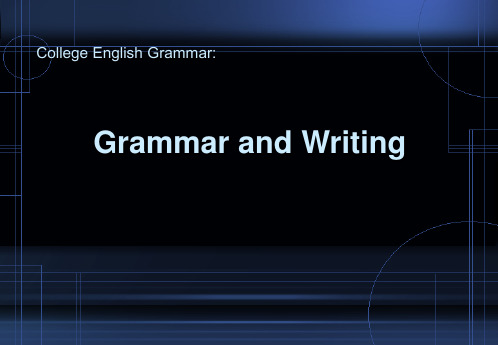
• Some of the buried workers are still alive.
• The babies grew nervous from the loud noise.
A verb is often made up of more than one word. The verb that expresses the action or state of being of the subject is called main verb. The word that accompany the main verb is called an auxiliary/ helping verb, which helps the main verb express mood or time by forming various tenses.
• In my garage, there is an old car. _______________. It is a Cadillac, a very classical luxury car, manufactured in 1966. The car has 65.000 original miles on it, but sitting in a damp garage for most of its life didn’t do many favors for it.
College English Grammar:
Grammar and Writing
Unit 1
Basic parts of a sentence (I)
• Grammar: 1. Subject and predicate 2.Hard-to-find subjects
《大学英语语法》课件—11Clause Adjective clauses
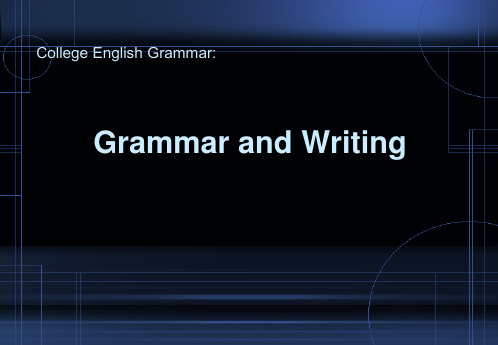
1. Functions and forms
An adjective clause is a sentence clause that modifies a noun or a pronoun as an adjective does. Both relative pronouns (who, whom, whose, that and which) and the subordinating conjunctions (where, when and why) may be used as introducers to begin adjective clauses.
Do remember that introducers play roles in the adjective clauses and relative pronouns replace the noun that the adjective clauses modify.
A noun + an adjective clause
• She forgot the name of the store. • At that store, her father bought her an MP4. • She forgot the name of the store where her father bought her
an MP4. • (where = at which; which = store; as an adverbial of the clause.)
• The sun had set. • We returned to our hotel at once. • As soon as the sun had set, we returned to our hotel at
大学英语语法9——不定式短语

2. Functions 2.1. As adjectives An infinitive phrase acts as an adjective that describes, limits, or modifies a noun or pronoun. An adjective infinitive phrase usually comes after the noun or pronoun it modified.
to find the little black lamb was almost white.
• I dropped my suit. • I dashed downstairs. • I wanted to tell George. • Dropping my suit, I dashed downstairs to tell George.
3. Sailors have seen monsters. • The monsters lived in the sea. • Sailors sometimes claim so. • Sailors sometimes claim to have seen monsters in the sea.
1. Infinitive forms:
• Simple: • Progressive: • Passive: • Perfect: • Passive + progressive: • Passive + perfect:
Infinitive forms to do to be doing to be done to have done to be being done to have been done
College English Grammar:
大学英语语法和写作College English Grammar and Writing 13 Su

•
In the sentence pattern “It + be + adj. + subject clause”, we
usually use subjective mood in the clause when the adjectives
are necessary, important, impossible, strange, natural, essential
3. Predicative clauses When a noun clause follows a link verb and functions as a complement of a subject, it is called a predicative clause. No comma is needed when we use the predicative clauses.
• This is the reason.
• Why are so many people unable to afford a house?
This is why so many people are unable to afford a house. [as a subject complement]
• How many people we are to invite is still a question. It is still a question how many people we are to invite.
When the subordinating word “if” introduces a subject clause, the clause can not be placed at the beginning; whereas, the clause can be placed both at the beginning and at the end when the subject clause is introduced by the subordinating word “whether”. For instance:
英语语法对我来说很头疼的大学英语作文

英语语法对我来说很头疼的大学英语作文English: Writing college English essays can be challenging, particularly when it comes to English grammar. The rules for proper grammar can seem overwhelming, especially with the nuances and exceptions that exist in the English language. It's crucial to pay attention to subject-verb agreement, verb tense consistency, punctuation, and sentence structure to effectively communicate your ideas. The use of articles, prepositions, and conjunctions also plays a significant role in creating clear and coherent sentences. Proofreading and editing your work are essential steps in ensuring that your writing is grammatically correct. While mastering English grammar takes time and practice, there are resources available, such as grammar guides, writing workshops, and online tools, that can help improve your language skills. With dedication and perseverance, you can overcome the challenges of English grammar and become a more confident and proficient writer.Translated content: 写大学英语作文可能是具有挑战性的,特别是当涉及到英语语法时。
关于英语语法的大学英语作文

关于英语语法的大学英语作文English: Understanding English grammar is essential for college students studying English as a second language. Grammar rules help students construct sentences correctly, leading to clear and effective communication. Without a solid grasp of grammar, students may struggle to convey their thoughts accurately, resulting in misunderstandings and confusion. By learning grammar, students can improve their writing skills, enhance their speaking abilities, and even increase their chances of academic success. Additionally, understanding grammar gives students confidence in their language abilities, allowing them to express themselves more confidently in both academic and social settings. In conclusion, mastering English grammar is crucial for college students, as it is the foundation for effective communication and academic achievement.中文翻译:理解英语语法对于学习英语作为第二语言的大学生至关重要。
大学英语语法和写作College English Grammar and Writing 15 S

Generally, two main clauses may be joined by
A subordinate clause is headed by a subordinate conjunction (after, before, when, if, though, etc.) or a relative pronoun (that, which, who, whom, and whose), functioning in the sentence as a noun, an adjective or an adverb.
2. Compound sentences
A sentence that has at least two or more main/ independent clauses is called a compound sentence. All of the main clauses of a compound sentence have their own subject(s) and their own predicate(s) and these main clauses are of equal importance in grammar. Usually, a compound sentence is joined by
Robert and I went into the living room where we talked for a couple of hours.
大学英语语法——连接词

• The directors wanted to win recognition for their work.
• The directors wanted to receive recognition for their work.
• The directors wanted both to win and to receive recognition for their work.
OK?”
• I waited for your permission patiently, now it finally comes. • ✓I waited for your permission patiently and now it finally comes.
In addition, as coordinating conjunctions join two groups of words, they are essentially placed in the middle of a sentence, rarely as openers.
College English Grammar:
Grammar and Writing
By Zhu Xiangjun
Unห้องสมุดไป่ตู้t 6
Modifiers:Conjunctions
• Grammar: Conjunctions • Writing:
Correcting: Antecedent Problems Rewriting: How to combine into compound sentences
Conjunctions
Conjunctions are words that join single words or groups of words. They can be subdivided into coordinating conjunctions, correlative conjunctions and subordinating conjunctions. 1. Coordinating conjunctions
英语语法让我很头疼大学英语作文

英语语法让我很头疼大学英语作文The English Grammar That Gives Me a Headache: College English CompositionAs a college student, I have encountered many challenges in my academic journey. One of the biggest obstacles I face is mastering English grammar. English grammar can be quite complex and confusing, and it often leaves me scratching my head in frustration. In this essay, I will discuss the difficulties I face with English grammar, the reasons why it is so challenging, and some strategies I use to improve my grammar skills.First of all, English grammar is filled with rules, exceptions, and irregularities that make it difficult to master. There are rules for verb tenses, sentence structure, word order, and punctuation, among other things. Not only do I need to remember all of these rules, but I also need to apply them correctly in my writing. This can be a daunting task, especially when English is not my first language.Another reason why English grammar is so challenging is that it is constantly evolving. New words are added to the language, old words fall out of use, and grammar rules change over time. This means that I need to stay up-to-date with thelatest trends in English grammar in order to communicate effectively.In addition, English grammar can be tricky because it is not always logical or consistent. There are many exceptions to the rules, and sometimes the same rule can be applied in different ways depending on the context. For example, irregular verbs do not follow the typical patterns of verb conjugation, and prepositions do not always have clear-cut rules for usage.Despite these challenges, I have found some strategies that help me improve my grammar skills. One strategy is to practice writing and speaking in English as much as possible. The more I use the language, the more familiar I become with its grammar and syntax. I also make use of grammar resources such as textbooks, online tutorials, and grammar checkers to help me understand the rules and identify mistakes in my writing.Another strategy I use is to pay attention to the grammar mistakes I make and learn from them. By analyzing my errors and understanding why they occur, I can avoid making the same mistakes in the future. I also seek feedback from my professors and peers, who can provide valuable insights on how to improve my grammar skills.In conclusion, English grammar can be a challenging aspect of college English composition. There are many rules to remember, exceptions to consider, and nuances to understand. Despite the difficulties I face, I am determined to continue working on my grammar skills and strive for improvement. By practicing regularly, seeking feedback, and staying informed about the latest trends in English grammar, I am confident that I can overcome this obstacle and become a proficient English writer.。
大学英语语法10——动名词短语

• Eating quietly can be difficult for children. • (A gerund phrase as a noun functions as a subject.)
5. He wanted to follow me around all morning. I had to think of a way. By the way I can prevent him from that.
I had to think of a way of preventing him from following me around all morning.
risk, • (can't) see, stop, suggest, take up, tolerate, understand
Exercises: Combine the sentences in each set into a single
clear sentence containing at least one gerund phrase.
II.1. Form An absolute phrase consists of a noun or a pronoun as a subject that is modified by a participle or participial phrase. It looks like a complete sentence but acts as an adverbial. It contains a subject, but not a predicate verb. Although it states a complete thought, it can not stand by itself as its predicate verb is replaced by a participle or participial phrases. • Noun + participle phrase = an absolute phrase
英语语法对我来说很头疼的大学英语作文
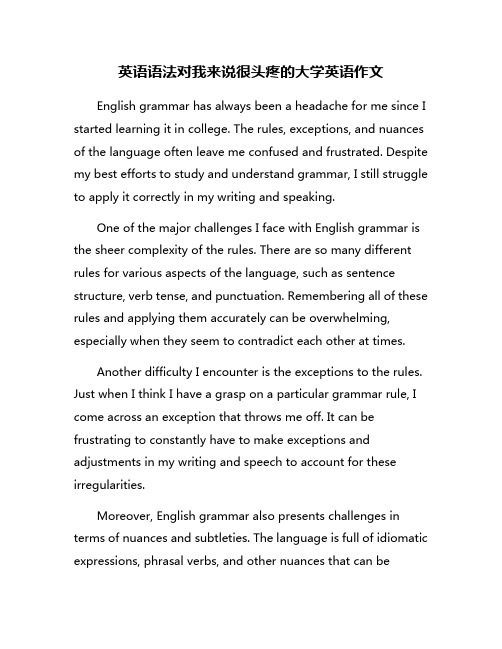
英语语法对我来说很头疼的大学英语作文English grammar has always been a headache for me since I started learning it in college. The rules, exceptions, and nuances of the language often leave me confused and frustrated. Despite my best efforts to study and understand grammar, I still struggle to apply it correctly in my writing and speaking.One of the major challenges I face with English grammar is the sheer complexity of the rules. There are so many different rules for various aspects of the language, such as sentence structure, verb tense, and punctuation. Remembering all of these rules and applying them accurately can be overwhelming, especially when they seem to contradict each other at times.Another difficulty I encounter is the exceptions to the rules. Just when I think I have a grasp on a particular grammar rule, I come across an exception that throws me off. It can be frustrating to constantly have to make exceptions and adjustments in my writing and speech to account for these irregularities.Moreover, English grammar also presents challenges in terms of nuances and subtleties. The language is full of idiomatic expressions, phrasal verbs, and other nuances that can bedifficult to grasp for non-native speakers like myself. Understanding and using these nuances correctly adds another layer of complexity to an already challenging subject.Despite these challenges, I continue to work on improving my English grammar skills through studying, practice, and feedback from teachers and peers. I know that developing a strong grasp of grammar is essential for effective communication in English, and I am determined to overcome my struggles in this area.In conclusion, English grammar is a formidable obstacle for me in my college English studies. The complexity of the rules, the prevalence of exceptions, and the nuances of the language all contribute to my difficulties in mastering grammar. However, I am committed to overcoming these challenges and becoming more proficient in English grammar through diligent effort and perseverance.。
关于英语语法令我头疼的大学英语作文

关于英语语法令我头疼的大学英语作文全文共3篇示例,供读者参考篇1English Grammar, the Bane of My ExistenceAs a college student studying English, I have come to dread one particular subject: English grammar. While some may find it fascinating or even easy, I have always struggled with the intricate rules and exceptions that come with mastering the English language. In this essay, I will explore the reasons why English grammar gives me a headache, how I have tried to improve my skills, and why I continue to struggle despite my best efforts.One of the main reasons why English grammar is so challenging for me is the sheer complexity of the rules. Unlike some other languages that have a more straightforward set of grammar guidelines, English is full of exceptions, irregular verbs, and confusing punctuation rules. Just when I think I have finally figured out a particular rule, I come across a sentence that breaks all the rules and leaves me scratching my head in confusion.Another reason why English grammar is so difficult for me is that there are so many resources available online and in textbooks that offer conflicting advice. For example, one source may tell me that it is incorrect to end a sentence with a preposition, while another source may say that it is perfectly acceptable in modern English. This constant barrage of contradictory information only serves to confuse me further and leaves me unsure of what is truly correct.In an effort to improve my grammar skills, I have tried various strategies over the years. I have attended grammar workshops, taken online courses, and even hired a tutor to help me with my writing. While these efforts have certainly helped me to better understand certain aspects of English grammar, I still find myself struggling with the finer points and nuances of the language.Despite my best efforts, I continue to make mistakes in my writing and speaking that I know could easily be avoided if I had a better grasp of English grammar. I often find myselfsecond-guessing my sentences, spending hours combing through my work for errors, and feeling frustrated when I realize that I have made a simple grammatical mistake yet again.In conclusion, English grammar is a subject that continues to challenge and frustrate me as a college student. While I have made some progress in improving my skills, I know that I still have a long way to go before I can confidently say that I have mastered the intricacies of the English language. However, I am determined to continue working on my grammar skills and hope that one day I will be able to write and speak fluently without the fear of making a mistake. Until then, English grammar will continue to be the bane of my existence.篇2The Study of English Grammar has always been a headache for many college students in their English classes. As a fundamental aspect of language learning, English grammar is essential for understanding and producing language effectively. However, the complexity and inconsistency of English grammar rules often leave students confused and frustrated.One of the main challenges of English grammar is the vast number of rules that govern the usage of different parts of speech, verb tenses, sentence structures, and punctuation. For example, English verbs can be irregular, requiring students to memorize different forms for past tense and past participle. Additionally, English word order can be confusing, with differentrules for affirmative sentences, negative sentences, questions, and conditional sentences. These nuances can be difficult for students to grasp, leading to errors in their writing and speaking.Another obstacle in learning English grammar is the lack of consistency in rules and exceptions. English grammar rules are often arbitrary and can contradict each other, making it difficult for students to know when to apply certain rules. For example, English has many irregular verbs, such as "go-went-gone," that do not follow regular patterns of conjugation. In addition, English has many words with multiple meanings and uses, making it challenging for students to understand how to use them correctly in context.Furthermore, the rules of English grammar are constantly changing and evolving, adding to the confusion for students. New words and phrases are added to the English language regularly, and grammar rules can vary based on regional dialects and informal speech. This variability can make it challenging for students to keep up with the latest trends in English language usage.Despite these challenges, mastering English grammar is essential for students who wish to communicate effectively in both academic and professional settings. Proper grammar iscrucial for writing essays, reports, and research papers, as well as for participating in discussions, presentations, and debates. Employers also value employees who can communicate clearly and professionally, making English grammar skills a valuable asset in the workplace.To overcome the challenges of English grammar, students can employ a variety of strategies. One effective approach is to practice grammar exercises regularly, such as completing worksheets, quizzes, and online exercises. Students can also read extensively in English to expose themselves to different grammatical structures and styles of writing. Working with a tutor or language partner can provide additional support and feedback on grammar errors.In conclusion, while English grammar can be a source of frustration for many college students, it is also a crucial aspect of language learning that cannot be overlooked. By recognizing the challenges of English grammar and employing effective study strategies, students can improve their grammar skills and become more confident and proficient speakers and writers of English.篇3Title: The Headache of English Grammar in College EnglishIntroductionEnglish grammar has always been a challenge for many students, especially for those studying English as a second language. In college, the complexity of English grammar becomes even more apparent, leading to headaches for students trying to master the language. This essay will explore the difficulties of English grammar in college English and ways to overcome them.Difficulty in Understanding RulesOne of the main reasons why English grammar is so difficult in college is the vast number of rules and exceptions to those rules. From tenses to sentence structure, students must grapple with a multitude of grammar rules that seem to defy logic at times. For example, irregular verbs, phrasal verbs, and complex sentence constructions can confuse even the most diligent students. Moreover, the nuances of English grammar can be subtle and hard to grasp, making it challenging for students to apply the rules correctly in their writing and speaking.Difficulty in Retaining InformationAnother common issue students face with English grammar in college is the struggle to retain all the information they have learned. With so many rules to remember and exceptions to keep track of, it is easy for students to forget the finer points of grammar. This can lead to mistakes in their writing and speaking, which can be frustrating for both students and their teachers. Additionally, the fast pace of college courses can make it difficult for students to fully grasp and internalize the grammar concepts they are taught, adding to the challenge of mastering English grammar.Difficulty in Applying Grammar CorrectlyEven when students understand the rules of English grammar, applying them correctly in real-life situations can be a daunting task. English grammar is not a static set of rules but a living, evolving system that can vary depending on context, style, and audience. Students must navigate the complexities of formal and informal language, academic and creative writing, and spoken and written communication, all while adhering to the rules of grammar. This can be overwhelming for students, leading to errors and misunderstandings in their use of English grammar.Ways to Overcome the ChallengesDespite the difficulties of English grammar in college, there are strategies that students can use to overcome these challenges. One of the most effective ways to improve grammar skills is through practice. By regularly practicing grammar exercises, writing essays, and speaking in English, students can reinforce their understanding of grammar rules and develop fluency in using them. Additionally, seeking feedback from teachers, peers, or tutors can help students identify areas where they need improvement and receive guidance on how to correct their mistakes. Finally, using online resources, such as grammar websites, apps, and videos, can provide students with additional support and explanation of grammar concepts.ConclusionIn conclusion, English grammar in college can be a headache for many students, but with perseverance and practice, it is possible to overcome the challenges. By understanding the rules of grammar, retaining the information, and applying grammar correctly, students can improve their English skills and become more confident in their language abilities. With determination and hard work, mastering English grammar in college is achievable, and students can take pride in their progress and success in the language.。
大学英语语法8——分词短语
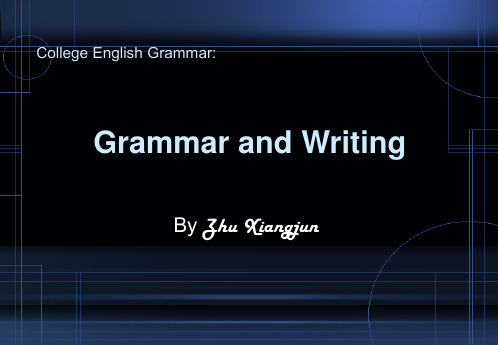
The past participle may be used in both active and passive voices and is used for: • modifying a noun as an adjective, with active sense; A tree fell on the road. The road was blocked. The road was blocked by a fallen tree.
The present participle in English is in the active voice and is used for:
1. modifying a noun as an adjective; The girl is dancing. The girlneighbor.
• The dancing girl is the daughter of my neighbor.
2. modifying a verb or whole sentence as an adverb. Jack smiled. Jack said hello to me.
• Smiling, Jack said hello to me.
A participle is a verb form used as an adjective to modify nouns and pronouns, or as an adverb to modify verbs, adjectives or other adverbs. Participles come in two forms: the present participle (V-ing) and the past participle (V-ed).
英语语法困扰英语作文大学
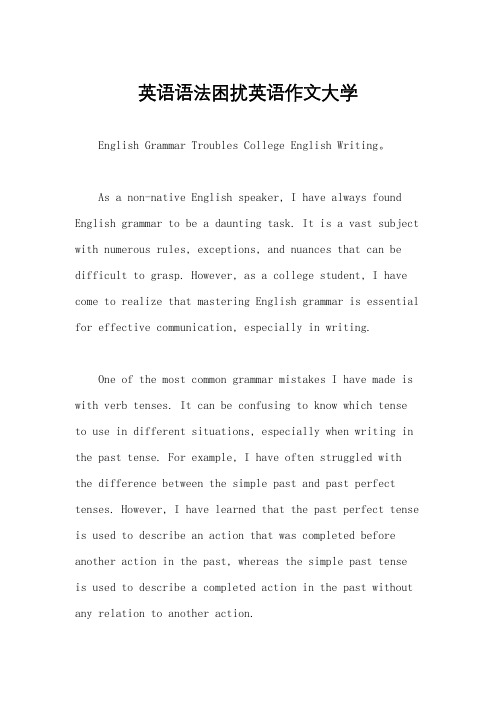
英语语法困扰英语作文大学English Grammar Troubles College English Writing。
As a non-native English speaker, I have always found English grammar to be a daunting task. It is a vast subject with numerous rules, exceptions, and nuances that can be difficult to grasp. However, as a college student, I have come to realize that mastering English grammar is essential for effective communication, especially in writing.One of the most common grammar mistakes I have made is with verb tenses. It can be confusing to know which tense to use in different situations, especially when writing in the past tense. For example, I have often struggled with the difference between the simple past and past perfect tenses. However, I have learned that the past perfect tense is used to describe an action that was completed before another action in the past, whereas the simple past tenseis used to describe a completed action in the past without any relation to another action.Another area that I have found challenging is subject-verb agreement. It can be easy to overlook this rule, especially when writing long sentences with multiple subjects and verbs. However, I have learned that the subject and verb must agree in number, meaning that a singular subject must have a singular verb, and a plural subject must have a plural verb. For example, "The dog barks" is correct, but "The dog bark" is incorrect.In addition to these grammar rules, I have also struggled with punctuation, especially the proper use of commas. It can be challenging to know when to use a comma, and when to use a semicolon or colon. However, I have learned that commas are used to separate items in a list, to separate clauses in a sentence, and to set off nonessential information. For example, "I need to buy milk, eggs, and bread" is correct, but "I need to buy milk eggs and bread" is incorrect.Overall, I have come to realize that mastering English grammar is crucial for effective communication, especiallyin writing. While it can be challenging, it is essential to take the time to learn and practice the rules of grammar. By doing so, I am confident that I will continue to improve my writing skills and become a more effective communicator in English.。
- 1、下载文档前请自行甄别文档内容的完整性,平台不提供额外的编辑、内容补充、找答案等附加服务。
- 2、"仅部分预览"的文档,不可在线预览部分如存在完整性等问题,可反馈申请退款(可完整预览的文档不适用该条件!)。
- 3、如文档侵犯您的权益,请联系客服反馈,我们会尽快为您处理(人工客服工作时间:9:00-18:30)。
1. Simple sentences
The most basic type of sentence is a simple sentence. It can be as short as one word (when the subject “you” is understood):
• Run!
1) a coordinating conjunction (for, and, nor, but, or, yet, so),
2) a conjunctive adverb (e.g. however, therefore, thus, etc.),
3) a semicolon alone.
• My brother has never been abroad before. • He is finding this trip very exciting. My brother has never been abroad before, so he is
A simple sentence may also have two or more subjects and/or predicates. • The president and his men took seats. • The president and his men took seats and discussed the problem.
Unit 15
Sentences
• Grammar: Sentences • Writing:
Correcting: Choppy/Stringy Sentences Rewriting: Variety in sentence structure
Sentences
A sentence is made up of a clause. A clause is a group of words that contains a subject and a predicate. Clauses can be put into two kinds: independent/main clauses and dependent/subordinate clauses. An independent/main clause consists of a subject and a predicate and can stand alone as a sentence. • the president took a seat • she plays an important role in the game
2. Compound sentences
A sentence that has at least two or more main/ independent clauses is called a compound sentence. All of the main clauses of a compound sentence have their own subject(s) and their own predicate(s) and these main clauses are of equal importance in grammar. Usually, a compound sentence is joined by
• Run!
• The policeman runs.
• The policeman runs fast.
• The policeman on duty runs fast towards the car.
• Receiving an emergent call from his men, the policeman on duty runs fast towards the waiting car.
A dependent/sdinate words such as that, which, what, when, where, why, how, because, though, whether, if, etc. It can not stand alone as a sentence though it consists of both a subject and a predicate. • when the president took a seat • because she plays an important role in the game
Notice: 1) Simple sentences can be very effective for drawing a
reader's attention, but you have to use them with care: too many simple sentences can make your writing seem choppy and childish. 2) In a simple sentence, no commas separate compound elements.
Usually, a simple sentence contains one independent/main clause. To be complete, it must have at least one subject and one predicate. Both the subject and the predicate may have modifiers such as adjectives, adverbs, prepositional phrases, participial phrases, etc. All of the following are simple sentences, because each contains only one clause:
